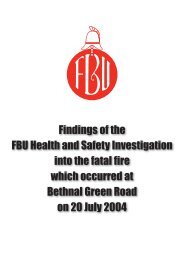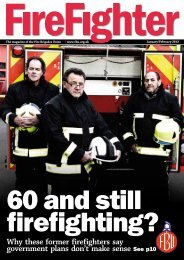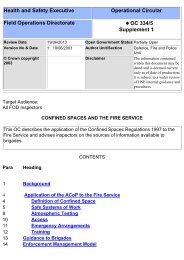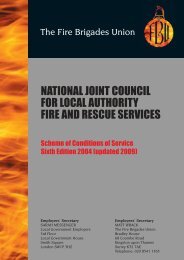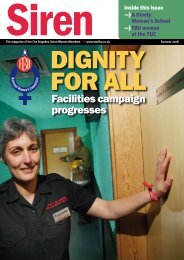Report - Fire Brigades Union
Report - Fire Brigades Union
Report - Fire Brigades Union
Create successful ePaper yourself
Turn your PDF publications into a flip-book with our unique Google optimized e-Paper software.
SECTION B — FIRE AND RESCUE SERVICE POLICY<br />
<strong>Fire</strong> Futures: Role of the <strong>Fire</strong> & Rescue Service<br />
(Delivery Models) <strong>Report</strong><br />
CURRENT & FUTURE CHALLENGES<br />
The immediate and greatest challenge to the <strong>Fire</strong> & Rescue<br />
Service (FRS) is that of funding. Financial support from the<br />
Government is set to reduce by c.30% over the next four<br />
years, while income from Council Tax is unlikely to keep pace<br />
with inflation as measured by the Consumer Price Index (while<br />
being roughly half that currently measured by the Retail Price<br />
Index). If this grant reduction is applied at the same level<br />
across all 46 FRSs it will prove particularly difficult for those<br />
that have already achieved significant budget reductions over<br />
the last few years, and which benefited least from the last<br />
Comprehensive Spending Review (which produced, in some<br />
cases, 3-year settlements that were cuts in real terms in a<br />
period when capping limits applied to Council Tax).<br />
For many and perhaps most FRSs, these funding reductions<br />
will imperil their ability to carry out risk-based budgeting and<br />
implement their local Integrated Risk Management Plans<br />
(IRMPs), let alone play an effective part in the National<br />
Framework. When all the frills have been removed, every<br />
spare ounce of fat burned off, and every possible efficiency<br />
saving identified and implemented, there will remain only real<br />
cuts to the core service and a real increase in casualties and<br />
property loss.<br />
The FRS, along with other agencies in the field of Community<br />
Risk Reduction and Response, also faces an intensification of<br />
the challenges it already has. Principally these are:<br />
Demographic<br />
The coming years will see a continuing increase in the size of<br />
the ‘vulnerable/harder-to-reach’ population groups.<br />
●<br />
●<br />
●<br />
●<br />
The 60+, 70+, 80+ and 90+ population groups are<br />
growing; meanwhile the younger working-age population<br />
(18 – 45) has diminished. This phenomenon is particularly<br />
acute in some of the FRS areas that have received the<br />
lowest grant settlement awards in recent years.<br />
The number of non-English speaking residents is<br />
increasing, and this trend is likely to continue (the number<br />
of non-English speaking primary school pupils in England<br />
has nearly doubled in the last decade). Engagement with<br />
these groups will be very challenging, particularly as FRSs<br />
are obliged to freeze recruitment.<br />
Rural FRSs report increasing challenges in engagement<br />
with the various Travelling Communities as the number of<br />
Travellers’ sites (both official and unofficial) increases, as<br />
prevention work in this area is very demanding of<br />
resources.<br />
Historically high levels of drug and alcohol abuse continue<br />
to lead to an increase in the number of people at risk to<br />
themselves and others.<br />
Economic<br />
In a period of continuing austerity household income (in real<br />
and/or absolute terms) is falling for many and will continue to<br />
fall, particularly in those areas most dependent on the public<br />
sector for employment.<br />
●<br />
●<br />
●<br />
●<br />
●<br />
People are likely to cut back on (so-called) ‘luxuries’ such<br />
as smoke alarms and other precautionary equipment, just as<br />
funding for FRSs to provide them free of charge is ending.<br />
There is likely to be a growing number of people, especially<br />
young people, living in Homes of Multiple Occupation,<br />
much of which is unofficial and falls outside current HMO<br />
regulation, hence is very difficult to identify.<br />
There will be an increase in the number of squats.<br />
The number of non-domestic fires (accidental and<br />
deliberate) is likely to increase.<br />
Income from Council Tax and Non Domestic Rates is likely<br />
to fall as businesses and householders go into bankruptcy.<br />
Climatic<br />
Climate change and general atmospheric warming is an<br />
irrefutable fact, irrespective of its cause. It leads to<br />
meteorological instability and greater extremes of weather.<br />
●<br />
●<br />
●<br />
There will continue to be more (and more severe)<br />
heathland and forest fires, some of which will threaten<br />
property, particularly in the South. There is little the FRS, on<br />
its own, can do to prevent such fires and reacting to them<br />
is hugely demanding on resources.<br />
Floods will continue to be more frequent and more severe,<br />
their consequences exacerbated and in part created by<br />
several decades of building on land that is now effectively<br />
flood plain. The role of the FRS in such incidents is currently<br />
ill-defined and typically leads to a demand to pump water<br />
out when there is nowhere sensible to pump it to.<br />
‘Severe weather’ of all kinds creates demands on the FRS<br />
to undertake rescue work.<br />
Other<br />
● Reducing budgets and a public sector pay freeze may put<br />
local strains on industrial relations.<br />
●<br />
●<br />
There is likely to be a short-to-medium term increase in<br />
civil unrest, of which the recent student demonstrations<br />
are a foretaste.<br />
Although it may have become more difficult for terrorist<br />
organisations to carry out major atrocities, the risk of<br />
smaller scale (but still serious) attacks on vulnerable targets<br />
may increase.<br />
The impact of all these challenges will of course be borne by<br />
the whole Community Risk Reduction and Response sector,<br />
not just the FRS. At the same time it is unlikely that the high<br />
expectations the public has of the sector (particularly the FRS)<br />
will diminish. The public is more demanding than ever of public<br />
services generally, and as the sector finds itself facing<br />
mounting difficulty in delivering its services to a diminishing<br />
budget, a growing gap – even if it exists in perception rather<br />
than reality – between expectation and actual service delivery<br />
will make it harder to engage with communities, particularly<br />
those that are already hard to reach.<br />
38 FBU Annual <strong>Report</strong> 2011











